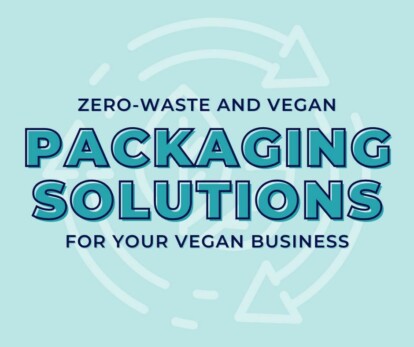Finding the right zero-waste and vegan packaging solutions for your vegan businesses


In our next blog mini-series, we’re diving into things to consider when raising a child on a vegan diet. In part one, we’ll be looking at veganism for babies, infants and preschool children. Part two will take a look at school-age children and adolescents.
If you regularly read the Ethical Globe blog, there’s a good chance that you follow a vegan diet or that it’s something you’re exploring. You probably have a number of reasons why veganism is important to you and may feel strongly that you want to raise your child(ren) as a vegan, too.
Naturally, many people become vegan because of ethical concerns. They are opposed to a system that exploits and harms other animals.
But, of course, there are other reasons why you might want to raise a child on a vegan diet.
Farmed animals are frequently – even, routinely – given antibiotics and hormones, ostensibly to fight potential infections, but also because these drugs boost growth rates, ensuring each animal is large enough to be slaughtered at the youngest age possible.
But, when humans eat the flesh of other animals that have been routinely fed antibiotics, it can lead to antimicrobial resistance.
The Centers for Diseases Control and Prevention in the US has described antimicrobial resistance as “an urgent global public health threat”. Indeed, it was associated with nearly five million deaths in 2019 worldwide and accounts for 2.8 million infections in the US every single year. Children under the age of five are the most vulnerable to these infections.
A plant-based diet can help to ensure that your child still responds well to antibiotics.
According to the British Nutrition Foundation, plant-based diets have also been linked to a lower risk of heart disease, strokes, type 2 diabetes, and some cancers.
Therefore, you may feel that raising your infant child as a vegan is a conscious decision to protect their health now and in the future.
And let’s not forget that industrial animal agriculture is a major contributor to ecological destruction, due to deforestation for pastureland and the chain reaction of consequences, including the destruction of ecosystems and species.
Experts counsel that a shift towards veganism will be integral to future sustainability.
Currently, some people still see raising a young child under school age on a vegan diet as controversial. This is often fuelled by sensational media headlines about “murder by malnutrition” (see the case of Shiela O’Leary who was jailed for life for murdering her 18-month-old son, Ezra, for a recent example of this).
But it’s important to look beyond the headlines. The murder by malnutrition cases typically show that the child hadn’t been fed a healthy, balanced vegan diet and that there are other issues of neglect that contributed to the death.
The tragic reality is that many children suffer the consequences of poor diets and monstrous neglect, but veganism offers a hook on which to hang the story.
That being said, there are important aspects of a vegan diet that you must be aware of and plan for if you intend to raise a child without any products derived from other animals.
Research by UCL Great Ormond Street Institute of Child Health found that, although vegan children have lower levels of harmful cholesterol, lower body fat, and healthier hearts than children who consume animal-derived products, they may also have lower bone density and are three times more likely to be vitamin B12 deficient than omnivores.
The latter two issues are typically caused by not consuming enough calcium, protein, and vitamins B12 and D.
Children need bone-specific nutrients because they’re growing. This is especially the case for infants and preschool children and also for adolescents. Therefore, if you are going to raise a child on a vegan diet, you should prioritise foods rich in protein, calcium and vital vitamins.
The Academy of Nutrition and Dietetics has issued the following statement:
“It is the position of the Academy of Nutrition and Dietetics that appropriately planned vegetarian, including vegan, diets are healthful, nutritionally adequate, and may provide health benefits for the prevention and treatment of certain diseases. These diets are appropriate for all stages of the life cycle, including pregnancy, lactation, infancy, childhood, adolescence, older adulthood, and for athletes.”
This statement reflects a growing openness to and awareness of veganism as a valid and healthy dietary option by leading nutrition authorities.
However, the keywords here are “appropriately planned”.
Many people who follow vegan diets actually eat very poor quality, highly processed food. A diet comprising crisps, rice cakes, veggie burgers and ready meals might be vegan, but that doesn’t make it healthy!
A good vegan diet should consist of a wide variety of wholefood plant-based foods. Meals should be varied and planned to include a balance of vegetables, proteins and carbs. The VVPC plate from Vegan Savvy is a good starting point.
In the UK, the NHS recommends that a child should be exclusively breastfed for the first six months of life. If you follow this advice, this means you can rely on breastmilk to give your infant all the nutrients they need.
If you are vegan and breastfeeding your child, you may need to increase your own iron and B12 intake.
If you are not breastfeeding for any reason, you’ll need to do your research about vegan breastmilk alternatives. It’s also advisable to seek professional advice from a GP or nutritionist.
You may decide, even if you don’t want to exclusively breastfeed or aren’t able, to express your milk and bottle feed. Alternatively, some vegans buy donor breast milk.
Otherwise, there are a few vegan baby formula options or dairy-free baby formulas, which may not be fully vegan because they contain small quantities of lanolin from sheep’s wool. The brands available will vary depending on which country you live in.
You can find a more in-depth guide on the Choose Veganism website.
Experts say that weaning a baby onto solid foods from the age of six months onwards is very similar to weaning a child onto an omnivore or vegetarian diet.
Parents are often tempted to start the weaning process by introducing various fruits or baby rice. Babies have a natural preference for sweet foods, which is probably where this stems from. However, many nutritionists support ‘Veg Led’ weaning because there’s growing evidence that children are more open to trying new flavours at this young age, which may make them more willing to eat a varied diet when they’re older (something that’s especially important for vegans).
From six months onwards, you can start to introduce your baby to fruit, grains, protein-containing foods and foods rich in iron and B12.
Protein-containing foods include chickpeas, beans, lentils, soya-based products, and nut butters. (The NHS says that babies can have smooth peanut butter from six months old but that you should always follow advice about food allergies, especially if there is a history of food allergy in your family).
Calcium is essential for growing children. A child typically doubles in size between birth and age three, and their weight increases by a factor of five – that’s a lot of growth to fuel! Your child will need plenty of dairy-free soya drinks and yoghurts, beans, pulses, almond butter, wholemeal bread, leafy green veg and dried fruits such as figs.
Beans, chickpeas, lentils, nut butters, wholemeal bread, brown rice, and fortified breakfast cereals are all good sources of iron. You can also boost your child’s iron absorption by giving them vitamin C-rich foods such as oranges, bell peppers, pineapple, strawberries, or cabbage.
Your child will benefit from foods rich in omega-3, too. Good choices for a vegan diet include ground almonds, ground chia or hemp seeds, or linseed oil.
You might want to continue breastfeeding your child in addition to increasing their solid meals or offer a vegan follow-on formula designed for children aged six months and upwards.
By the age of one, your child will hopefully be eating a varied and balanced diet and joining in with family meals.
Many people decide to continue breastfeeding in combination with solid food as their child grows into a toddler.
The Vegan Society has a helpful Vegan Eatwell Guide, which offers a good starting point for what a varied and balanced diet looks like. Remember, you may need to adjust this diet appropriately to provide your child with bone-specific nutrients.
As you can see from the Vegan Society’s guide, your child should eat:
You can find much more detailed nutritional information on The Vegan Society website.
From this age, you can also give your child unsweetened and calcium-fortified milk alternatives (e.g., soya, coconut, oat or almond drinks). Choose full-fat options, as ‘good’ fats are important for brain development, especially during the first two years of life.
In the UK, many medical experts advise against giving children rice-containing milks before the age of four and a half years old. This is largely due to concerns about rice milk containing arsenic. In addition, rice milk is much lower in protein than some other dairy alternatives.
Many vegan foods are high in fibre, which can fill children up quickly. You may want to (occasionally) give them starchy foods such as white bread or white rice with some meals to boost their calorie intake.
Foods such as hummus, nut butters, and full-fat dairy-free yoghurts and milk alternatives can also help your child to get the calories they need.
Again, it’s advisable to get professional advice about this and all other aspects of your child’s vegan diet.
Currently, the Department of Health and Social Care in the UK recommends that all children between the ages of six months and five years should have vitamin A, C and D supplements every day.
However, there’s a fine line between not enough supplements and too many. The NHS recommends talking to a pharmacist about what would be the best supplement for your child.
Vegan children can often benefit from a vitamin B12 supplement, or you may prefer to give them foods fortified with B12, such as breakfast cereals, dairy-free yoghurts or milks, or yeast extract spreads like Marmite.
An iodine supplement is sometimes advised, too, so this is something to check with a pharmacist, nutritionist or GP.
These days, many adults and children have a vitamin D deficiency. It’s only found in a few foods, and the best source is summer sunlight on the skin. Of course, you will still need to protect your child from sun damage caused by harmful UV rays.
In the UK, the British Dietetic Association is one of the oldest organisations to represent dietetics and nutrition. Its position is that a vegan diet is suitable and safe for people of all ages, including babies and infants, as long as it is well-planned.
You will need to do your research about what nutrition will meet the needs of your growing infant or pre-schooler, including advice about supplements.
Reliable advice is available through organisations like the British Dietetic Association and The Vegan Society. Of course, you will find many social media pages dedicated to veganism, too, but it goes without saying that you should always check the person’s credentials and look to trusted sources for advice.